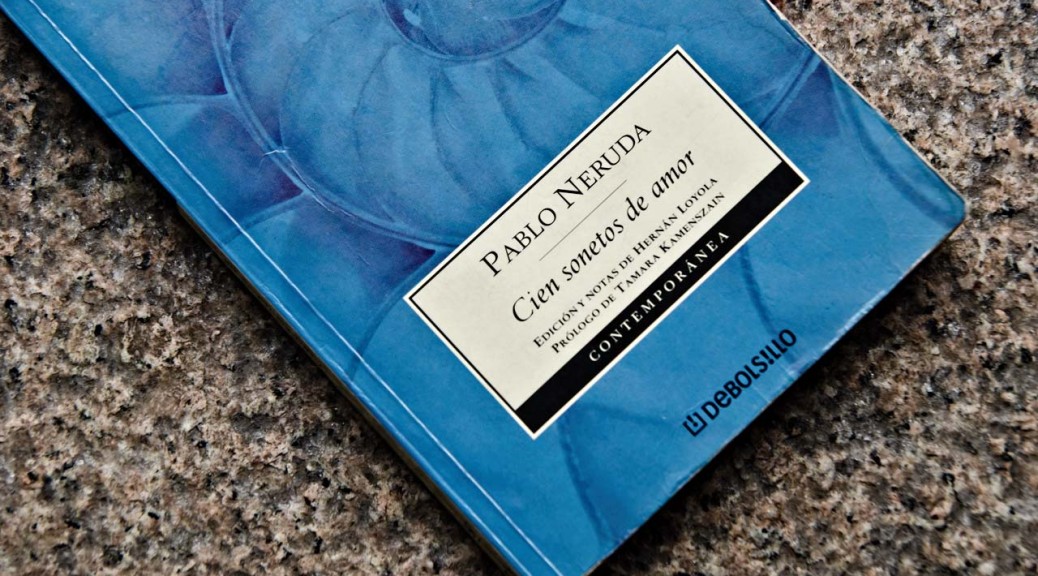
Category Archives: weekly book

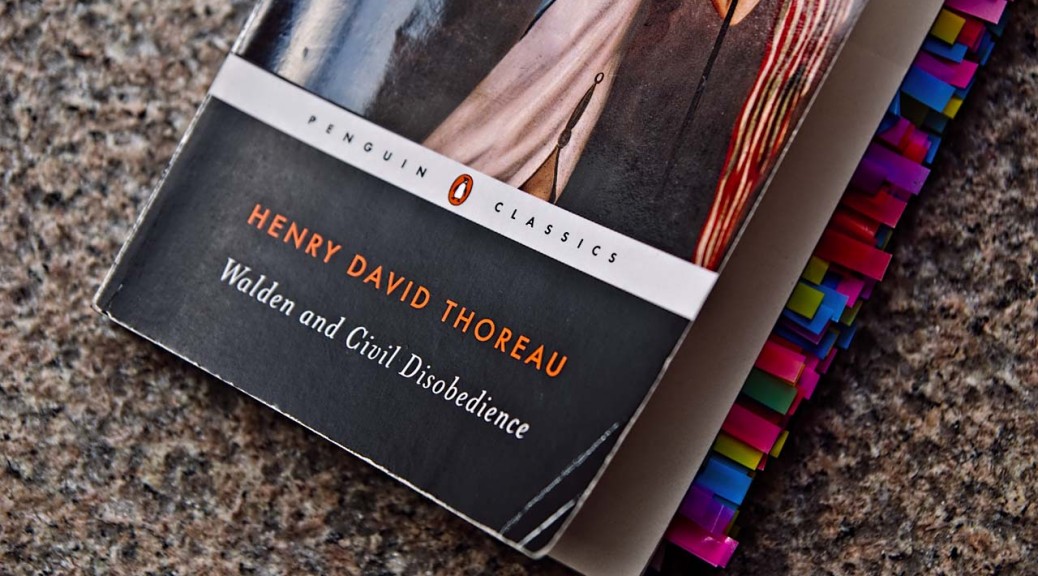
Walden and Civil Disobedience
Read:
Thoreau, Henry David., and Michael Meyer. Walden and Civil Disobedience. NY: Penguin, 1983. Print.
Walden first published 1854.
Civil Disobedience first published 1849.
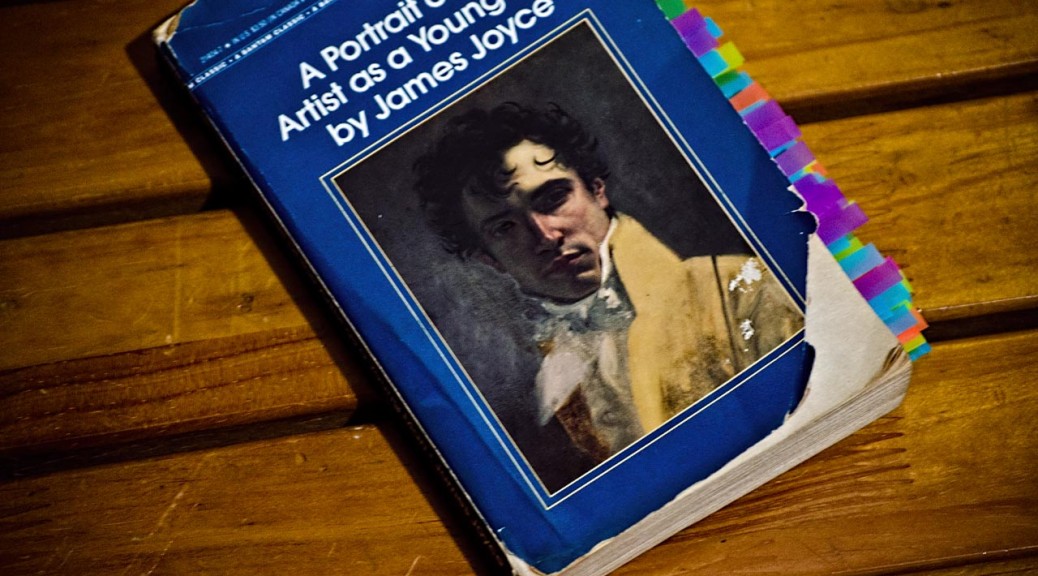
A Portrait of the Artist as a Young Man (III)
Joyce, James. A Portrait of The Artist as a Young Man. New York: Bantam Books, 1992. Print. (First Edition 1916).
—
“sighting in the ascent, through a region of viscid gloom.
“He halted on the landing before the door and then, grasping the porcelain knob, opened the door quickly. He waited in fear, his soul pining within him, praying silently that death might not touch his brow as he passed over the threshold, that the fiends that inhabit darkness might not be given power over him. He waited still at the threshold as the entrance to some dark cave. Faces were there; eyes: they waited and watched.” p. 130
“He had sinned. He had sinned so deeply against heaven and before God that he was not worthy to be called God’s child.” p. 131
“His eyes were dimmed with tears and, looking humbly up to heaven, he wept for the innocence he had lost.” p. 133
“Once soul was lost; a tiny soul: his. It flickered once and went out, forgotten, lost. The end: black cold void waste.” p. 134
“and had first spoked of the kingdom of God to poor fishermen, teaching all men to be meek and humble of heart.” p. 135
“he called first to His side, the carpenters, the fishermen, poor and simple people following a lowly trade, handling and shaping the wood of trees, mending their nets with patience.” p. 135
“His blood began to murmur in his veins, murmuring like a sinful city summoned from its sleep to bear its doom. Little flakes of fire fell and powdery ashes fell softly, alighting on the houses of men. They stirred, waking from sleep, troubled by the heated air.” p. 136
“SUNDAY was dedicated to the mystery of the Holy Trinity, Monday to the Holy Ghost, Tuesday to the Guardian Angels, Wednesday to Saint Joseph, Thursday to the Most Blessed Sacrament of the Altar, Friday to the Suffering Jesus, Saturday to the Blessed Virgin Mary.” p. 141
“the three theological virtues, in faith in the Father Who had created him, in hope in the Son Who had redeemed him, and in love of the Holy Ghost Who had sanctified him;” p. 142
“Frequent and violent temptations were a proof that the citadel of the soul; had not fallen and that the devil raged to make it fall.” p. 147
“Some of the boys had then asked the priest if Victor Hugo were not the greatest French writer. The priest had answered that Victor Hugo had never written half so well when he had turned against the church as he had written when he was a catholic.” p. 150
“He had seen himself, a young and silentmannered priest, entering a confessional swiftly, ascending the altarsteps, incensing, genuflecting, accomplishing the vague acts of the priesthood which pleased him by reason of their semblance of reality and of their distance from it.” p. 152
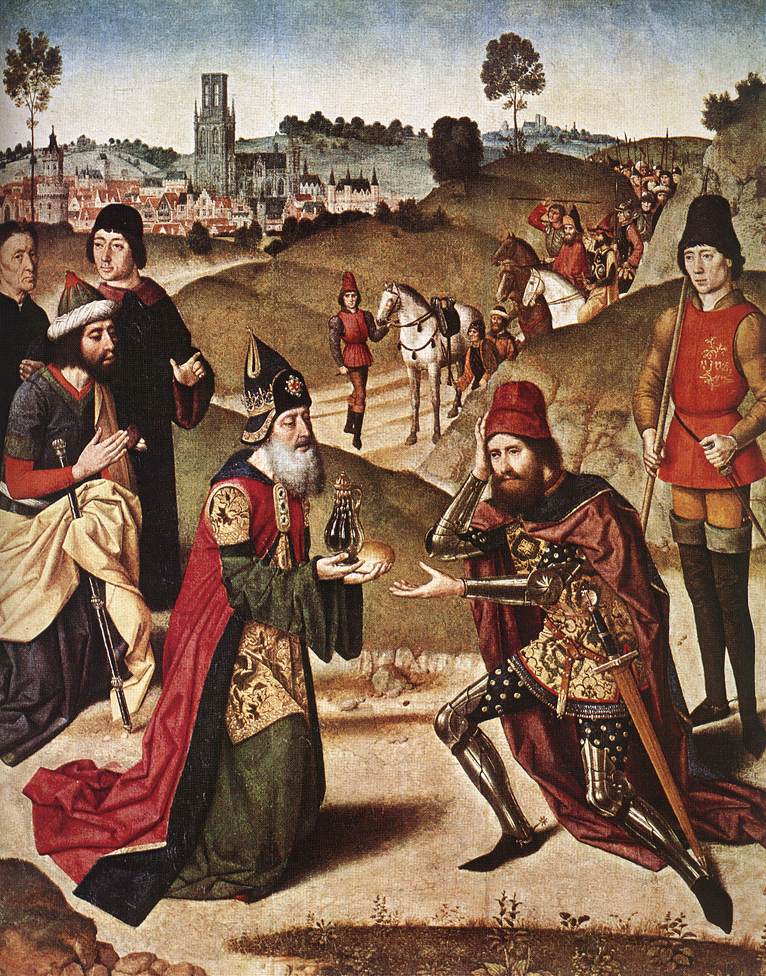
Dieric Bouts,the older. At The Church of Saint Peter, Leuven, Belgium. Created: 1464 – 1467. Via Wikimedia.
“the order of Melchisedec.” p. 153
*****”He drew forth a phrase from his treasure and spoke it softly to himself:
-A day of dapled seaborne clouds.-
The phrase and the day and the scene harmonised in a chord. Words. Was it their colours? He allowed them to glow and fade, hue after hue: sunrise gold, the russet and green of apple orchards, azure of waves, the grey-fringed fleece of clouds. No, it was not their colours: it was the pose and balance of the period.” p. 160
askance
***”They were voyaging across the deserts of the sky, a host of nomads on the march, voyaging high over Ireland, westward bound. The Europe they had come from lay out there beyond the Irish Sea, Europe of strange tongues and valleyed and woodbegirt and citadelled and of entrenched and marshalled races.” p. 161

John Everett Millais – National Portrait Gallery. Via Wikimedia.
“His morning walk across the city had begun; and he foreknew that as he passed the sloblands of Fairview he would think of the cloistral silverveined prose of Newman; that as he walked along the North Strand Road, glancing idly at the windows of the provision ships, he would recall the dark humour of Guido Cavalcanti and smile; that as he went by Baird’s stone cutting works in Talbot Place the spirit of Ibsen would blow though him like a keen wind, a spirit of wayward boyish beauty;”p. 170
“His mind when wearied of its search for the essence of beauty amid the spectral words of Aristotle or Aquinas turned often for its pleasure to the dainty songs of the Elizabethans.” p. 170
“His thinking was a dusk of doubt and selfmistrust, lit up at moments by the lightnings of so clear a splendour that in those moments the world perished about his feet as if it had been fire consumed: and thereafter his tongue grew heavy and he met the eyes of others with unanswering eyes for he felt that the spirit of beauty had folded him round like a mantle and that in reveie at least he had been acquainted with nobility.” p. 171
“he had tried to peer into the social life of the city of cities through the words implere ollam denariorum which the rector had rendered sonorously as the filling of a pot with denaries.” p. 174
“but yet it wounded him to think that he would never be but a shy guest at the feast of the world’s culture and that the monkish learning, in terms of which he was striving to forge out an esthetic philosophy, was held no higher by the age he lived in than the subtle and curious jargons of heraldry and falconry.” p. 174
“the droll statue of the national poet of Ireland.” p. 174
“-Aquinas-answered Stephen-says pulcra sunt quæ visa placent.-” p. 180
“-In so far as it is apprehended by the sight, which I suppose means here esthetic intellection, it will be beautiful. But Aquinas also says Bonum est in quod tendit appetitus. In so far as it satisfies the animal craving for warmth fire is a good. In hell, however, it is an evil.-” p. 180

Nineteenth century Photochrom postcard of the Cliffs of Moher in County Clare in Ireland showing cliffside table and refreshments. Via Wikimedia.
“-These questions are very profound, Mr Dedalus-said the dean.-It is like looking down from the cliffs of Moher into the depth. Many go down into the depths and never come up. Only the trained diver can go down into those depths and explore them and come to the surface again.-” p. 181
“You know Epictetus?-
-An old gentleman-said Stephen coarsely-who said that the soul is very like a bucketful of water.-
-He tells us in his homely way-the dean went on-that he put an iron lamp before a statue of one of the gods and that a thief stole the lamp. What did the philosopher do? He reflected that it was in the character of a thief to steal and determined to buy and earthen lamp next day instead of the iron lamp.-” p. 181
“whether words are being used according to the literary tradition or according to the tradition of the marketplace. I remember a sentence of Newman’s, in which he says of the Blessed Virgin that she was detained in the full company of the saints. The use of the word in the marketplace is quite different. I hope I am not detaining you.-” p. 182
“That?-said Stephen.-Is that called a funnel? Is it not a tundish?-” p. 182
“-And to distinguish between the beautiful and the sublime-the dean added-to distinguish between moral beauty and material beauty. And to inquire what kind of beauty is proper to each of the various arts.” p. 184
“-In pursuing these speculations-said the dean conclusively-there is, however, the danger of perishing of inanition.” p. 184

The British Library – Image taken from page 274 of ‘Finland in the Nineteenth Century: by Finnish authors. Illustrated by Finnish artists. Via Wikimedia.
“-I may not have his talent-said Stephen quietly.
-You never know-said the dean brightly.-We never can say what is in us. I most certainly should not be despondent. Per aspera ad astra.-“

A Portrait of the Artist as a Young Man (II)
Joyce, James. A Portrait of The Artist as a Young Man. New York: Bantam Books, 1992. Print. (First Edition 1916).
—
“The sentence of Saint James which says that he who offends against one commandment becomes guilty of all had seemed to him first a swollen phrase until he had began to grope in the darkness of his own state. From the evil seed of lust all other deadly sins had spring forth: pride in himself and contempt of others, covetousness in using money for the purchase of unlawful pleasures, envy of those whose vices he could not reach to and calumnious murmuring against the pious, gluttonous enjoyment of food, the dull glowering anger amid which he brooded upon his longing, the swamp of spiritual and bodily sloth in which his whole being had sunk.” p. 100
Francis Xavier
“the apostle of the Indies.” p. 102
Ignatius of Loyola
“A retreat, my dear boys, signifies a withdrawal for a while form the cares of our life, the cares of this workaday world, in order to examine the state of our conscience, to reflect on the mysteries of holy religion and to understand better why we are here in this world.” p. 104
“What doth it profit a man to gain the whole world if he suffer the loss of his immortal soul? Ah, my dead boys, believe me there is nothing in this wretched world that can make up for such a loss.” p. 104
“Banish from your minds all worldly thoughts, and think only of the last things, death, judgment, hell and heaven. He who remembers these things, says, Ecclesiastes, shall not sin for ever. He who remembers the last things will act and think with them always before his eyes.” p. 105
“What did it avail then to have been a great emperor, a great general, a marvellous inventor, the most learned of the learned? All were as on before the judgment seat of God.” p. 107
“The stars of heaven were falling upon the earth like the figs cast by the figtree which the wind has shaken. The sun, the great luminary of the universe, had become as sackcloth of hair. The moon was blood red. The firmament was a scroll rolled away. The archangel Michael, the prince of the heavenly host, appeared glorious and terrible against the sky. With one foot on the sea and one foot on the land he blew from the archangelical trumpet the brazen death of time. The three blasts of the angel filled all the universe. Time is, time was, but time shall be no more. At the last blast the souls of universal humanity throng towards the valley of Jehosaphat, rich and poor, gentle and simple, wise and foolish, good and wicked.” p. 107
Valley of Josaphat
Absalom
“O you who present a smooth smiling face to the world while your soul within is a foul swamp of sin, how will it fare with you in that terrible day?” p. 108
“Death is the end of us all. Death and judgement, brought into the world by the sin of our first parents, are the dark portals that close our earthly existence, the portals that open into the unknown and the unseen, portals through which every soul must pass, alone, unaided save by its good works, without friend or brother or parent or master to help it, alone and trembling.” p. 108
“Theologians consider that it was the sin of pride, the sinful thought conceived in an instant: non serviam: I will not serve. That instant was his ruin. He offended the majesty of God by the sinful thought of one instant and God cast him out of heaven into hell for ever.” p. 111
“Adam and Eve were then created by God and placed in Eden, in the plain of Damascus, that lovely garden resplendent with sunlight and colour, teeming with luxuriant vegetation. The fruitful earth gave them her bounty: beasts and birds were their willing servants: they knew not the ills our flesh is heir to, disease and poverty and death: all that a great and generous God could do for them was done.” p. 112
“-Alas, my dear little boys, they too fell. The devil, once a shining angel, a son of the morning, now a foul fiend came n the shape of a serpent, the subtlest of all the beasts of the field. He envied them. He, the fallen great one, could not bear to think that man, a being of clay, should possess the inheritance which he by his sin had forfeited for ever.” p. 112
“the damned are so utterly bound and helpless that, as a blessed saint, Saint Anselm, writes in his book on Similitudes, they are not even able to remove from the eye a worm that gnaws it.” p. 114
“-They lie in exterior darkness. For, remember, the fire of hell gives forth no light. As, as the command of God, the fire of the Babylonian furnance lost its heat by not its light so, at the command of God, the fire of hell, while retaining the intensity of its heat, burns eternally in darkness. It is a neverending storm of darkness, dark flames and dark smoke of burning brimstone, amid which the bodies are heaped one upon another without even a glimpse of air. Of all the plagues with which the land of the Pharaohs was smitten one plague alone, that of darkness, was called horrible.” p. 114
” And then imagine this sickening stench, multiplied a millionfold and a millionfold again from the millions upon millions of fetid carcasses massed together in the reeking darkness, a huge and rotting human fungus. Imagine all this and you will have some idea of the horror of the stench of hell.” p. 115
“Depart from me, ye cursed, into everlasting fire which was prepared for the devil and his angels!-” p. 118
“He passed up the staircase and into the corridor along the walls of which the overcoats and waterproofs hung like gibbeted malefactors, headless and dripping and shapeless. And at every step he feared that he had already died, that his soul had been wrenched forth of the sheath of his body, that he was plunging headlong though space.” p. 118
“The English lesson began with the hearing of the history. Royal persons, favourites, intriguers, bishops, passed like mute phantoms behind their veil of names. All had died: all had been judged. What did it profit a man to gain the whole world if he lost his soul? At last he had understood: and human life lay around him, a plain of peace whereon antilike men laboured in brotherhood, their dead sleeping under quiet mounds.” p. 119-120
“-Sin, remember, is a twofold enormity. It is a base conssent to the promptings of our corrupt nature to the lower instincts, to that which is gross and beastlike; and it is also a turning awat from the counsel of our higher nature, from all that is pure and holy, from the Holy God Himself. For this reason mortal sin is punished in hell by two different forms of punishment, physical and spiritual.” p. 121
***”Now imagine a mountain of sand, a million miles high, reaching from the earth to the farthest heavens, and a million miles broad, extending to remotest space, and a million miles in thickness: and imagine such an enormous mass of countless particles of sand multiplied as often as there are leaves in the forest, drops of water in the mighty ocean, feathers on birds, scales on fish, hairs on animals, atoms in the vast expanse of the air: and imagine that as the end of every million years a little bird came to that mountain and carried away in its beak a tiny grain of that sand. How many millions upon millions of centuries would pass before that bird had carried away even a square foot of that mountain, how many eons upon eons of ages before it had carried away all. Yet at the end of that immense stretch of time not even one instant of eternity could be said to have ended; even then, at the end of such a period, after that eon of time the mere thought of which makes our very brain reel dizzily, eternity would have scarcely begun.” p. 125-126
“The ticking went on unceasingly; and it seemed to this saint that the sound of the ticking was the ceaseless repetition of the words; ever, never. Ever to be in hell, never to be in heaven; ever to be shut off from the presence of God, never to be shut off from the presence of God, never to enjoy the beatific vision; ever to be eaten with flames, gnawed by vermin, goaded with burning spikes,” p. 126
“-As sin, an instant of rebellious pride of the intellect, made Lucifer and a third part of the cohorts of angels fall from their glory.” p. 127-128.

Books January 2017
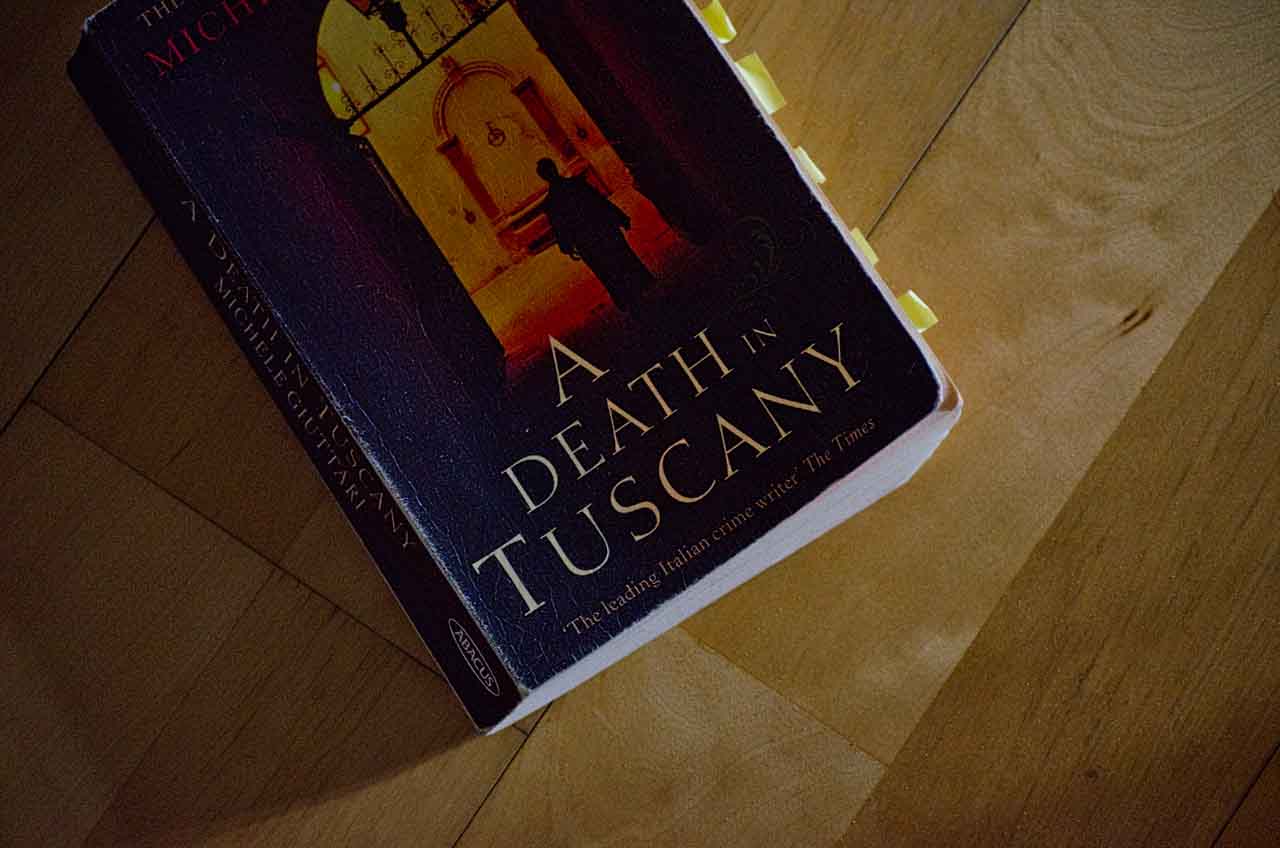 Giuttari, Michele, and Howard Curtis. A Death in Tuscany. London: Abacus, 2009. Print.
Giuttari, Michele, and Howard Curtis. A Death in Tuscany. London: Abacus, 2009. Print.
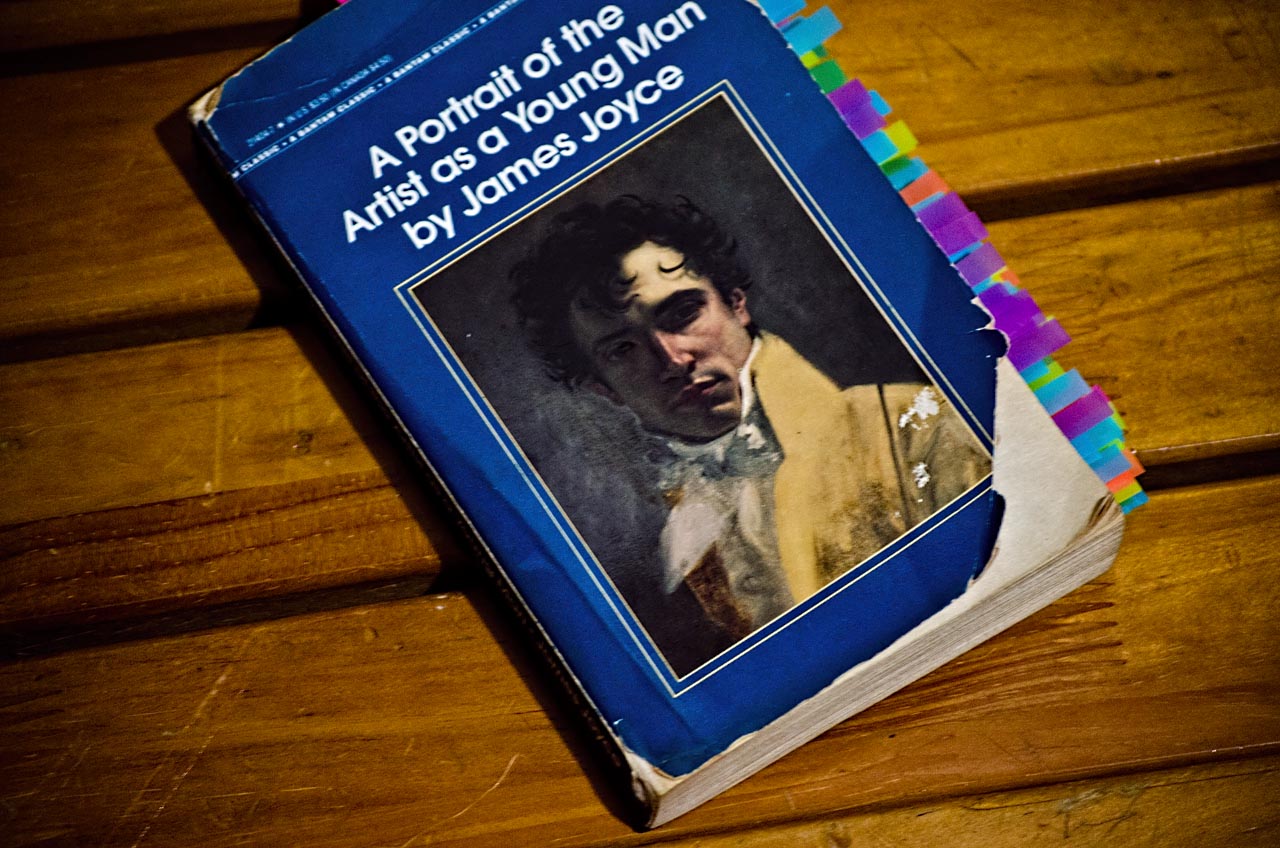 (I) Joyce, James. A Portrait of The Artist as a Young Man. New York: Bantam Books, 1992. Print. (First Edition 1916).
(I) Joyce, James. A Portrait of The Artist as a Young Man. New York: Bantam Books, 1992. Print. (First Edition 1916).
(V) Joyce, James. A Portrait of The Artist as a Young Man. New York: Bantam Books, 1992. Print. (First Edition 1916).
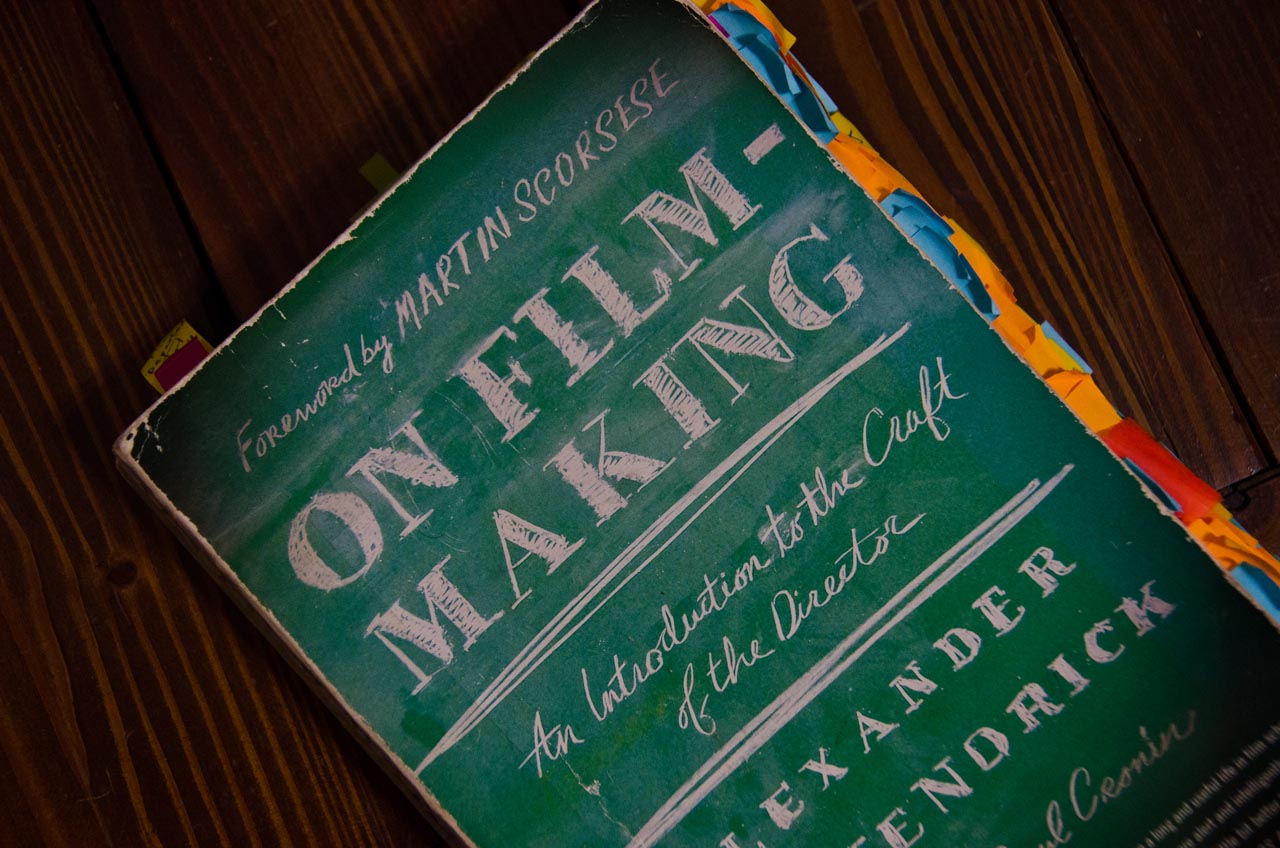 (I) Mackendrick, Alexander. On film-making: an introduction to the craft of the director. New York: Faber and faber, 2005. Print.
(I) Mackendrick, Alexander. On film-making: an introduction to the craft of the director. New York: Faber and faber, 2005. Print.
(II)
(III)
(IV)
(V)
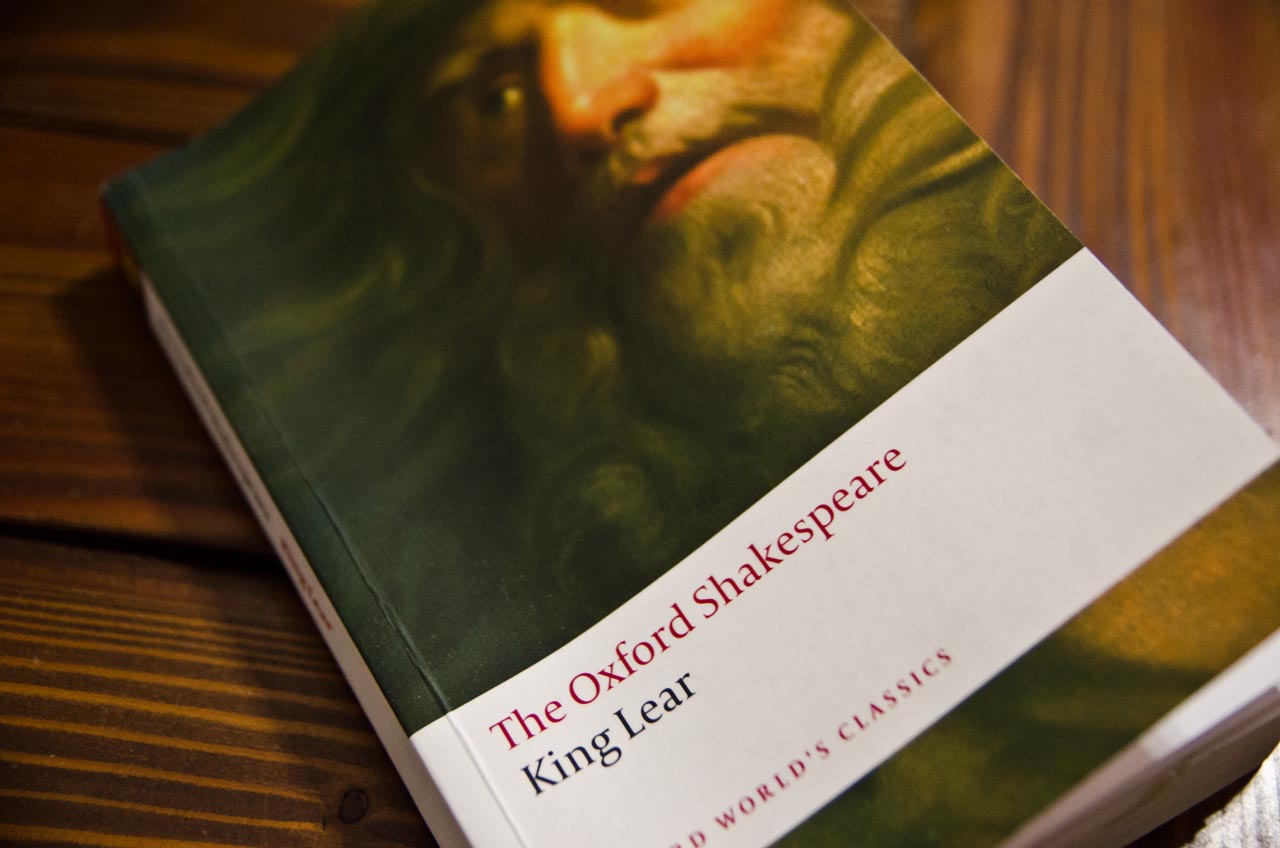 (I) Shakespeare, William, and Stanley Wells. The History of King Lear. Oxford: Oxford UP, 2008. Print.
(I) Shakespeare, William, and Stanley Wells. The History of King Lear. Oxford: Oxford UP, 2008. Print.
(II) Shakespeare, William, and Stanley Wells. The History of King Lear. Oxford: Oxford UP, 2008. Print.
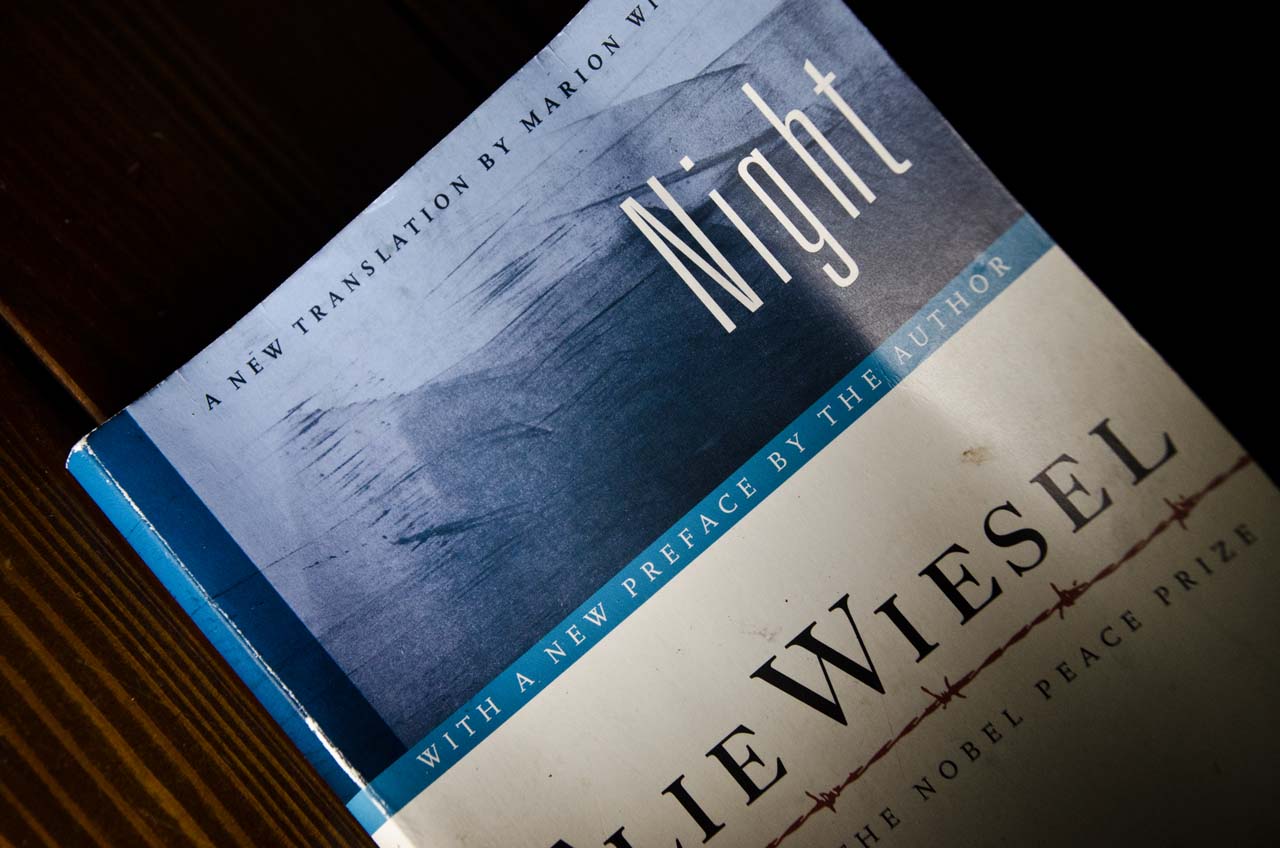 Wiesel, Elie, and Marion Wiesel. Night. New York, NY: Hill and Wang, a Division of Farrar, Straus and Giroux, 2006. Print. (First Ed. 1958).
Wiesel, Elie, and Marion Wiesel. Night. New York, NY: Hill and Wang, a Division of Farrar, Straus and Giroux, 2006. Print. (First Ed. 1958).
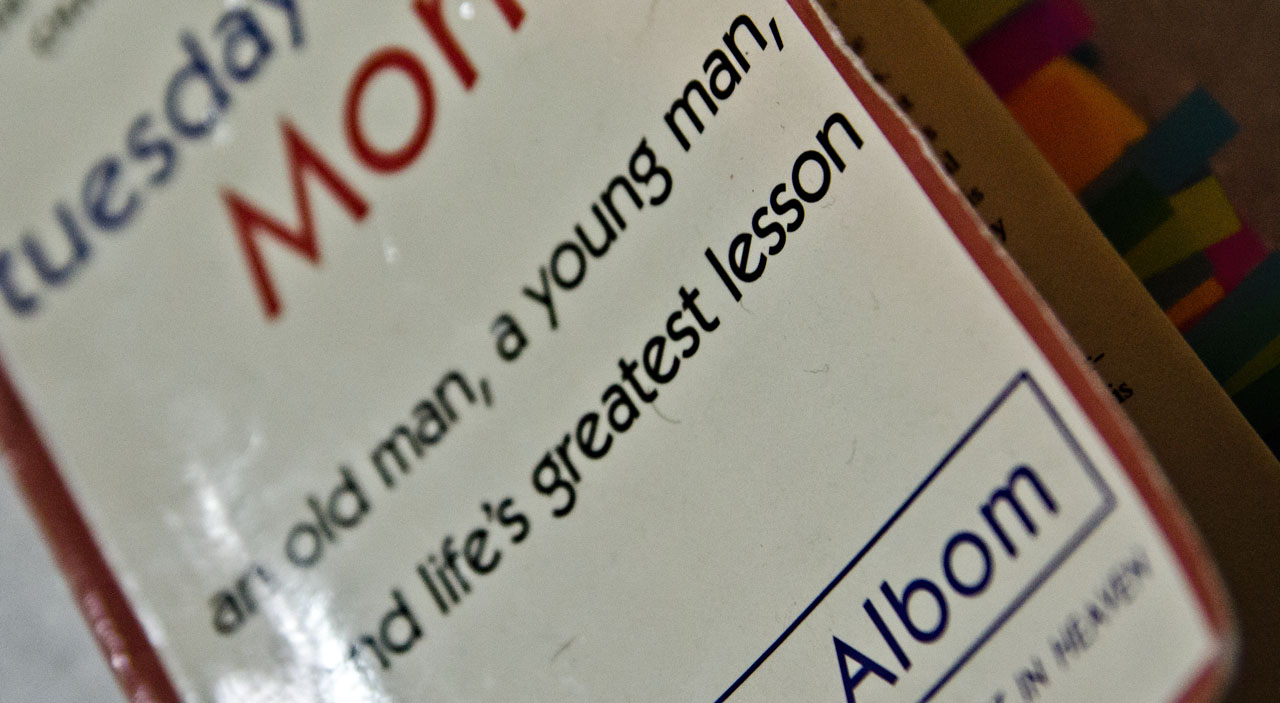 Albom, Mitch. Tuesdays With Morrie: an Old Man, a Young Man, and Life’s Greatest Lesson. New York: Anchor Books, 1997. Print.
Albom, Mitch. Tuesdays With Morrie: an Old Man, a Young Man, and Life’s Greatest Lesson. New York: Anchor Books, 1997. Print.
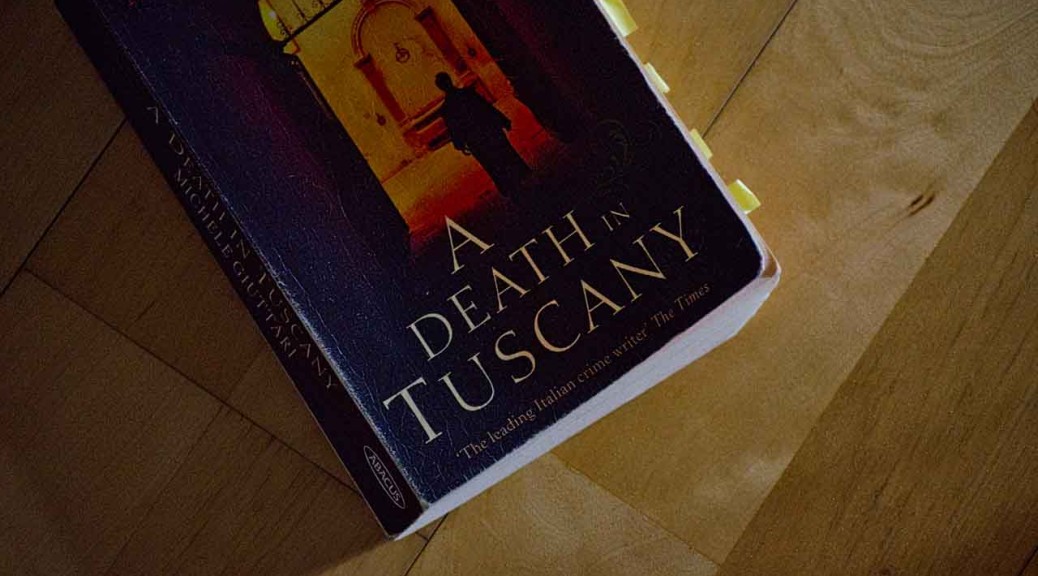
A Death in Tuscany
Giuttari, Michele, and Howard Curtis. A Death in Tuscany. London: Abacus, 2009. Print.
“Friendship is preferable to honors. It is better to be loved than honored.” Aristotle.
See Nicomechaen Ethics Book VIII Chapter 8 by Aristotle
River Arno flood of 1966
North Africans and Albanians in Florence p. 21-22
“The personal effects of the dead are always disturbing. It is as if they have suddenly lost their value along with their owner. They appear as they are, piles of objects more or less worn down by a use to which they wil no longer be put… But that wasn’t what disturbed Ferrara as he bent to pick up the wretched market-stall ring. It was the image of the girl reaching out her little hand to choose it from among others, the childish illusions she may have had in her mind as she slipped it on her finger.” p. 34
Police reports 119-121.
“Piazza della Republica to the Via degli Strozzi… Giambologna’s grim little devil at the corner of Via dei Vecchietti.” p. 125
see IL DIAVOLINO DEI VECCHIETTI
ilex evergreen oak
finding Claudia Pizzi’s leather shoulder bag containing her mobile and wallet with ID. p. 172
“He was the son of poor peasants from the Agro Pontino who had only ever known three coats of arms, the arms of Savoy, the Fascist emblem, and the shield of the Italian republic.” p. 197
“two columns of the Temple. The one in the north is Boaz, and the one in the south is Jachin.” p. 202
“The three columns symbolise Wisdom, Strength and Beauty.” p. 203
Masonic ritual and symbolism
Pigpen cipher
בֵּית־הַמִּקְדָּשׁ Solomon’s Temple
Italian August bank holiday
Marble quarries in Carrara
To read:
Purloined Letter short story by Edgar Alan Poe

A Portrait of the Artist as a Young Man (I)
Joyce, James. A Portrait of The Artist as a Young Man. New York: Bantam Books, 1992. Print. (First Edition 1916).
—
To Read:
Finnegans Wake. 1939 (took Joyce seventeen years to write).
“Et ignotas animum dimittit in artes.” OVID, Metamorphoses, VIII., 18. (And he sets his mind to unknown arts) p. 1
“Then he heard the noise of the refectory every time he opened the flaps of his ears. It made a roar like a train at night. And when he closed the flaps the roar was shut off like a train going into a tunnel.” p. 7
“-Tell us, Dedalus, do you kiss your mother before you go to bed? Stephen answered:
-I do.
Wells turned to the other fellows and said:
-O, I say, here’s a fellow says he kisses his mother every night before he goes to bed.
The other fellows stopped their game and turned round, laughing. Stephen blushed under their eyes and said:
-I do not.
Wells said:
-O, I say, here’s a fellow says he doesn’t kiss his mother before he goes to bed.
They all laughed again. Stephen tried to laugh with them. He felt his whole body hot and confused in a moment. What was the right answer to the question?” p. 8
“But the Christmas vacation was very far away: but one time it would come because the earth moved round always.” p. 9
“There was a picture of the earth on the first page of his geography: a big ball in the middle of clouds. Fleming had a box of crayons and one night during free study he had coloured the earth green and the clouds maroon.” p. 9
“He turned to the flyleaf of the geography and read what he had written there: himself, his name and where he was.
Stephen Dedalus
Class of Elements
Clongowes Wood College
Sallins
County Kildare
Ireland
Europe
The World
The Universe” p. 10
County Kildare, Ireland
“What was after the universe? Nothing. But was there anything round the universe? Nothing. But was there anything round the universe to show where it stopped before the nothing place began? It could not be a wall but there could be a thin thin line there all round everything. It was very big to think about everything and everywhere. Only God could do that.” p. 10
Cork, Ireland.
“The corridors were darkly lit and the chapel was darkly lit. Soon all would be dark and sleeping. There was cold night air in the chapel and the marbles were the colour the sea was at night. The sea was cold day and night: but it was colder at night.” p. 12
“It would be lovely to sleep for one night in that cottage before the fire of smoking turf, in the dark lit by there fire, in the warm dark, breathing the smell of the peasants, air and rain and turf and corduroy. But, O, the road there between the trees was dark! You would be lost in the dark. It made him afraid to think of how it was.” p. 12
“The prefect’s shoes went away. Where? Down the staircase and along the corridors or to his room at the end? He saw the dark. Was it true about the black dog that walked there at night with eyes as big as carriagelamps? They said it was the ghost of a murderer. A long shiver of fear flowed over his body. He saw the dark entrance hall of the castle.” p. 13
“And the train raced on over the flat lands and past the Hill of Allen. The telegraph poles were passing, passing. The train went on and on. It knew. There were lanterns in the hall of his father’s house and ropes of green branches.” p. 14-15
See Fionn mac Cumhaill and the Fianna
Hill of Allen
***”Every rat had two eyes to look out of. Sleek slimy coats, little little feet tucked up to jump, black slimy eyes to look out of. They could understand how to jump. But the minds of rats could not understand trigonometry. When they were dead they lay on their sides. Their coats dried then. They were only dead things.” p. 16
“How pale the light was at the window! But that was nice. There fire rose and fell on the wall. It was like waves. Someone had put coal on and he heard voices. They were talking. It was the noise of waves. Or the waves were talking among themselves as they rose and fell.
He saw the sea of waves, long dark waves rising and falling, dark under the moonless night. A tiny light twinkled at the pierhead where the ship was entering: and he saw a multitude of people fathered by the water’s edge to see the ship that was entering their harbour.” p. 21
“Perhaps they had stolen a monstrance to run away with it and sell it somewhere. That must have been a terrible sin, to go in there quietly at night, to open the dark press and steal the flashing gold thing into which God was put on the altar in the middle of flowers and candles at benediction while the incense went up in clouds at both sides as the fellow swung the censer and Dominic Kelly sang the first part by himself in the choir. But God was not in it of course when they stole it. But still it was a strange and a great sin even to touch it.” . 40
Monstrance
“The word was beautiful: wine. It made you think of dark purple because the grapes were dark purple that grew in Greece outside houses like white temples. But the faint smell off the rector’s breath had made him feel a sick feeling on the morning of his first communion.” p. 41
“-Where did you break your glasses? repeated the prefect of studies.
-The cinderpath, sir.
-Hoho! The cinderpath! cried the prefect of studies. I know that trick.
Stephen lifted his eyes in wonder and saw for a moment Father Dolan’s whitegrey not young face, his baldy whitegray head with fluff at the sides of it, the steel rims of his spectacles and his no-coloured eyes looking through the glasses. Why did he say he knew that trick?
-Lazy idle little loafer! cried the prefect of studies. Broke my glasses! An old schoolboy trick! Out with your hand this moment!” p. 44
“A hot burning stinging tingling blow like the loud crack of a broken stick made his trembling hand crumple together like a leaf in the fire” p. 44
“Stephen knelt down quickly pressing his beaten hands to his sides. To think of them beaten and swollen with pain all in a moment made him feel so sorry for them as if they were not his own but someone else’s that he felt sorry for.” p. 45
“He saw the rector sitting at a desk writing. There was a skull on the desk and a strange solemn smell in the room like the old leather of chairs.
His heart was beating fast on account of the solemn place he was in and the silence of the room: and he looked at the skull and at the rector’s kind-looking face.” p. 50
“He would be very quiet and obedient: and he wished that he could do something kind for him to show him that he was not proud.” p. 53
“Stephen knelt at his side respecting, though he did not share, his piety. He often wondered what his granduncle prayed for so seriously. Perhaps he prayed for the souls in purgatory or for the grace of a happy death or perhaps he prayed that God might send him back a part of the big fortune he had squandered in Cork.” p. 56
“Trudging along the road or standing in some grimy wayside public house his elders spoke constantly of the subjects nearer their hearts, of Irish politics, of Munster and of the legends of their own family, to all of which Stephen lent an avid ear.” p. 56
“The hour when he too would take part in the life of that world seemed drawing near and in secret he began to make ready for the great part which he felt awaited him there nature of which he only dimly apprehended.
His evenings were his own; and he pored over a ragged translation of The Count of Monte Cristo. The figure of that dark avenger stood forth in his mind for whatever he had heard or divined in childhood of the strange and terrible.” p. 56
“Outside Blackrock, on the road that led to the mountains, stood a small whitewashed house in the garden of which grew many rosebushes: and in this house, he told himself, another Mercedes lived. Both on the outward and on the homeward journey he measured distance by this landmark: and in his imagination he lived through a long train of adventures, marvellous as those in the book itself, towards the close of which there appeared an image of himself, grown older and sadder, standing in a moonlit garden with Mercedes who had so many years before slighted his love, and with a sadly proud gesture of refusal, saying:
-Madam, I never eat muscatel grapes.” p. 57
To read:

Dantès sur son rocher, affiche de Paul Gavarni pour Monte Cristo d’Alexandre Dumas. 1846.
The Count of Monte Cristo by Alexandre Dumas
“He passed unchallenged among the docks and along the quays wondering at the multitude of corks that lay bobbing on the surface of the water in a thick yellow scum, at the crowds of quay porters and the rumbling carts and the ill dressed bearded policemen. The vastness and strangeness of the life suggested to him by the bales of merchandise stocked along the walls or swung aloft out of the holds of streamers wakened again in him the unrest which had sent him wandering in the evening from garden to garden in search of Mercedes.” p. 60-61
“He sat listening to the words and following the ways of adventure that lay open in the coals, arches and vaults and winding galleries and jagged caverns.
Suddenly he became aware of something in the doorway. A skull appeared suspended in the gloom of the doorway. A feeble creature like a monkey was there, drawn there by the sound of voices at the fire. A whining voice came from the door asking:
-Is that Josephine?” p. 62
To read:
Lord Byron:
Don Juan, Manfred, Childe Harold’s Pilgrimage, Mazeppa, Hebrew Melodies.
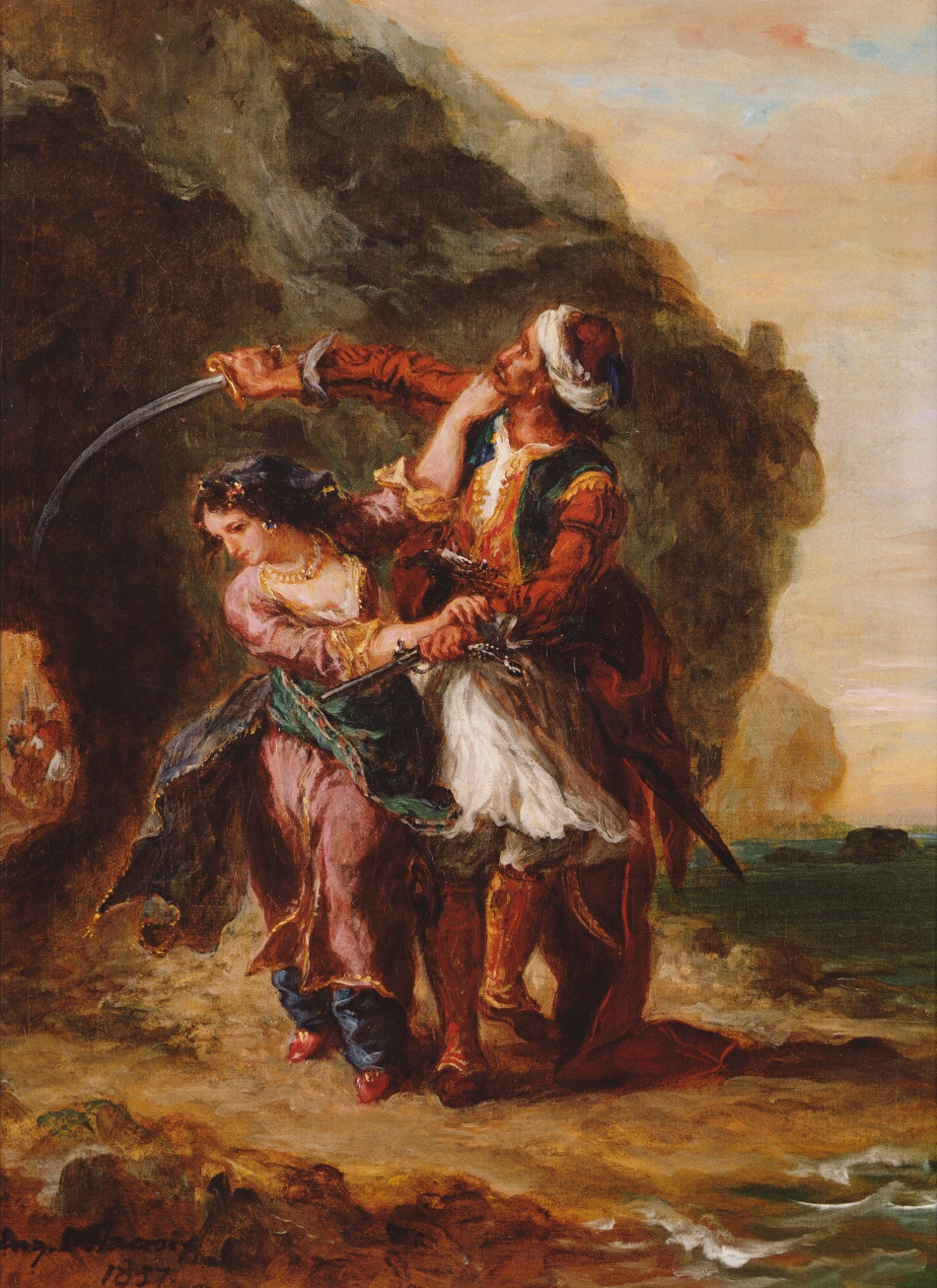
The Bride of Abydos or Selim and Zuleika. Painting, 1857, by Eugène Delacroix depicting Lord Byron’s work.
“The light spread upwards from the glass roof making the theatre seem a festive ark, anchored among the hulks of houses, her frail cables of lanterns looping her to her moorings.” p. 69
“Then a noise like dwarf artillery broke the movement. It was the clapping that greeted the entry of the dumb bell team on the stage.” p. 69
“Stephen shook his head and smiled in his rival’s flushed and mobile face, beaked like a bird’s. He had often thought it strange that Vincent Heron had a bird’s face as well as a bird’s name.” p. 70
“-Here. It’s about the Creator and the soul. Rrm… rrm…rrm…Ah! without a possibility of ever approaching nearer. That’s heresy.
Stephen murmured:
-I mean without a possibility of ever reaching.
It was a submission and Mr Tate, appeased, folded up the essay and passed it across to him, saying:
-O…Ah! ever reaching. That’s another story.
But the class was not so soon appeased. Though nobody spoke to him of the affair after class he could feel about him a vague general malignant joy.” p. 73
“As soon as the boys had turned into Clonliffe Road together they began to speak about books and writers, saying what books they were reading and how many books there were in their father’s bookcases at home. Stephen listened to them in some wonderment for Boland was the dunce and Nash the idler of the class. In fact after some talk about their favourite writers Nash declared for Captain Marryat who, he said, was the greatest writer.
-Fudge! said Heron. Ask Dedalus. Who is the greatest writer, Dedalus?
Stephen noted the mockery in the question and said:
-Of prose do you mean?
-Yes.
-Newman, I think.
-Is it Cardinal Newman? asked Boland.
-Yes, answered Stephen.” p. 74
To read:
John Henry Newman
The Dream of Gerontius, Apologia Pro Vita Sua.
Naval officer and writer Frederick Marryat
See: Confiteor
“-Admit that Byron was no good.
-No.
-Admit.
-No.
-Admit.
-No. No.
At lasty after a fury of plunges he wrenched himself free. His tormentors set off towards Jone’s Road, laughing and jeering at him, while he, half blinded with tears, stumbled on, clenching his fists madly and sobbing.” p. 76
“While his mind had been pursuing its intangible phantoms and turning in irresolution from such pursuit he had heard about him the constant voices of his father and of his masters, urging him to be a gentleman above all things and urging him to be a good catholic above all things. These voices had now come to be hollow sounding in his ears.” p. 77
“He gave them ear only for a time but he was happy only when he was far from them, beyond their call, alone or in the company of phantasmal comrades.” p. 78
“He stood still and gazed up at the sombre porch of the morgue and from that to the dark cobbled laneway at its side.” p. 80
“-That is hose piss and rotted straw, he thought. It is a good odour to breathe. It will calm my heart. My heart is quite calm now. I will go back.” p. 80
****”As the train steamed out of the station he recalled his childish wonder of years before and every event of his first day at Clongowes. But he felt no wonder now. He saw the darkening lands slipping away past him, the silent telegraphpoles passing his window swiftly every four seconds, the little glimmering stations, manned by a few silent sentries, flung by the mail behind her and twinkling for a moment in the darkness like fiery grains flung backwards by a runner.” p. 81
“He listened without sumpathy to his father;s evocation of Cork and of scenes of his youth-a tale broken by sighs or draughts from his pocket flask whenever the image of some dead friend appeared in it, or whenever the evoker remembered suddenly the purpose of his actual visit.” p. 81
“They drove in a jingle across Cork while it was still early morning and Stephen finished his sleep in a bedroom of the Victorian Hotel.” p. 81
“His father was standing before the dressingtable, examining his hair and face and moustache with great care, craning his neck across the water jug and drawing it back sideways to see the better. While he did so he sang softly to himself with quaint accent and phrasing:
“‘Tis youth and folly
Makes young men marry,”” p. 82
“The consciousness of the warm sunny city outside his window and the tender tremors with which his father’s voice festooned the strange sad happy air, drove off all the mists of the night’s ill humour from Stephen’s brain.” p. 82
“Then he had been sent away from home to a college, he had made his first communion and eaten slim jim out of his cricket cap and watched the firelight leaping and dancing on the wall of a little bedroom in the infirmary and dreamed of being dead, of mass being said for him by the rector in a black and gold cope, of being buried then in the little graveyard of the community off the main avenue of lines. But he had not died then. Parnell had died.” p. 86-87
River Lee (Cork)
River Liffey (Dublin)
“His mind seemed older than theirs: it shone coldly on their strifes and happiness and regrets like a moon upon a younger earth. No life or youth stirred in him as it had stirred in them.” p. 89
“His childhood was dead or lost and with it his soul capable of simple joys and he was drifting amid life like the barren shell of the moon.
“Art thou pale for weariness
Of climbing heaven and gazing on the earth,
Wandering companionless?…” p. 89
To read:
Percy Bysshe Shelley
Prometheus Unbound, Ozymandias, Ode to the West Wind, To a Skylark, Music, When Soft Voices Die, The Cloud, The Masque of Anarchy.

Louis Édouard Fournier, The Cremation of Percy Bysshe Shelley, oil on canvas, Liverpool, Walker Art Gallery. Louis Édouard Fournier (1857-1917). Via Wikimedia.
Bambi vs. Godzilla
Mamet, David. Bambi vs. Godzilla: On the Nature, Purpose, and Practice of the Movie Business. Kindle Edition. 2007.
Bambi Meets Godzilla | Marv Newland (1969)
“To succeed, a film must treat the audience member as an audience member, not as a commissar of culture.” location 698
“The commissar gets her thrill not from the film but from the power to admonish.” location 699
real filmmakers “Will they fail? Certainly. Both artistically and commercially. But (a) they have no other choice and (b) realizing that their final choices must be essentially subjective, they may learn to trust their instincts. Also (c) they’ll have more fun.” location 702
“Like any human endeavor, like you and me, they have inevitably been exposed to and have, in the main, submitted to the power of self-corruption, of self-righteousness, to the abuse of power. But like General della Rovere, like you and me, like the studio executives, they possess the possibility of beauty and, hence, for human transformation: not as preaching, not as instruction, not as doctrine—all of which, finally, are out of place in the cinema and can awaken, at best, but self-righteousness.” location 740
“The garbage of exposition, backstory, narrative, and characterization spot-welds the reader into interest in what is happening now. It literally stops the show.” location 866
***”When the film turns narrative rather than dramatic, when it stands in for the viewer’s imagination, the viewer’s interest is lost.” location 1040
***”The writer may choose to supply stock, genre, or predictable answers to the magic questions, and the drama will be predictable and boring. The writer will have saved himself the agony of indecision, self-doubt—of work, in short—and so, of course, will the protagonist.” location 1230
“The gags, here, happen to be identical to Aristotle’s “incidents,” that is, those occurrences without which the plot cannot move forward.” location 1391
“Shoot an entrance and an exit. It’s free.” location 1627
***”Our ability to conceptualize about both the process and the product is accompanied, and inspired, by the pure animal joy of submersion in a mystery.” location 1653
“Wisdom, therefore, lies not in the phenomonological question “What does a duck look like?” but, rather, in the practical “What is a duck looking for?”” location 1658
******”one may learn to prevail through understanding rather than strength—the basic tenet of jujitsu” location 1668
“Well, the poor man, unhampered by the capacity to waste, was forced to employ thought, and he wondered: What does a duck like? How does a duck see?” location 1678
“We have all had the experience of saying of a statue, “How lifelike,” and, of a life mask, cast from the human form and painted to perfection, “How lifeless.”” location 1679
“For the actual human being and the actual duck were created by, and so contain, a mystery. They cannot be reduced to mere measurements, and all attempts to do so (whether through the caliper of the decoy maker or through the audience testing of the social scientist) result in lifeless parody.” location 1681
“For another name for “chance” is “mystery,” and another name is “art.”” location 1685
“Jewish rabbinical tradition notes that adultery is like murder, for it is a crime that cannot be undone. Violation of the aesthetic distance is a rupture of the artist’s compact with the audience, and, similarly, its rupture cannot be mended.” location 1790
***”the difference between enjoyment and stimulation. One leaves the ballet feeling refreshed, as a promise has been fulfilled. One quits the video-game or pornographic film feeling empty and vaguely debauched—for one has only been stimulated. The brain, here, craves a repetition of the stimulation, as with any drug.” location 1833
“One may sit in front of the television for five hours, but after King Lear one goes home.” location 1835
*****”violence—their belligerence masks their fear and displays their ignorant belief that battles are somehow won by intimidation.” location 1894
“Violent encounters are won only by those putting themselves at risk of violence.” location 1895
“Aristotle cautions that it is insufficient for the hero to get the idea. Many modern moviemakers, however, act as if they hadn’t read his book. Their films depict the gentle progress of the protagonist toward self-actualization—usually depicted as a slow, arms-extended twirling on a beach (as if the expression of a racial memory of our descent from the shipworm). location 2040
“These men, and their performances, are characterized by the absence of the desire to please.” location 2055
“On screen, they don’t have anything to prove, and so we are extraordinarily drawn to them. They are not “sensitive”; they are not antiheroes; they are, to use a historic term, “he-men.” location 2056
Fail-Safe (1964) Sidney Lumet
The Life and Death of Colonel Blimp (1943) Michael Powell and Emeric Pressburger (The Archers)
“But consensus is, of course, the dead opposite of that subjectivity that is the essence of the theatrical experience.” location 2385
*******”And so, now firmly self-understood as part of a jury, he utters the phrase that is the foundation of society and the death of art: “What do you think?” Consensus, enshrined as right thinking, ensues, and the stage is set for mediocrity.” location 2400
“productive subjectivity” location 2441
“They are lost in the wilderness and prefer, as might you or I, a broken compass to no compass at all.” location 2449
“They who lack talent expect things to happen without effort.” location 2546
Cavalcade (1933) Frank Lloyd
High Noon (1952) Fred Zinnemann (story told in “nearly real time”)
Mickey Mouse in Vietnam (1968) Whitney Lee Savage (short)
December, 2013.
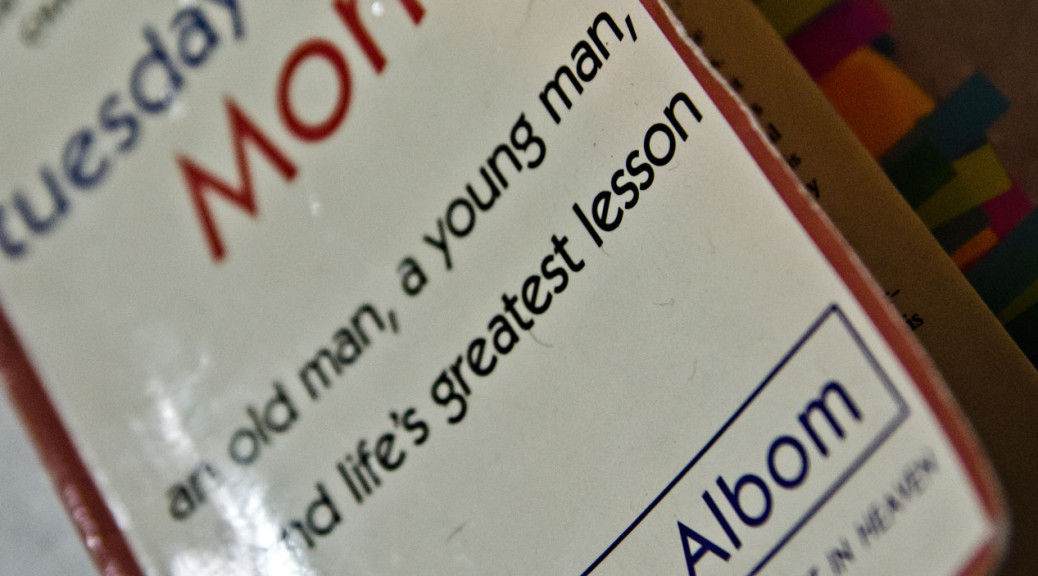
Tuesdays With Morrie
Albom, Mitch. Tuesdays With Morrie: an Old Man, a Young Man, and Life’s Greatest Lesson. New York: Anchor Books, 1997. Print.
“My old professor, meanwhile, was stunned by the normalcy of the day around him. Shouldn’t the world stop? Don’t they know what has happened to me?
But the world did not stop, it took no notice at all,” p. 8
“Do I wither up and disappear, or do I make the best of my time left?” p. 10
Don’t assume that it’s too late to get involved.” p. 18
“I decided I’m going to live-or at least try to live-the way I want, with dignity, with courage, with humor, with composure.” p. 21
“There are some mornings when I cry and cry and mourn for myself. Some mornings, I’m so angry and bitter. But it doesn’t last too long. Then I get up and say, ‘I want to live…'” p. 21
“I had become too wrapped up in the siren song of my own life. I was busy.” p. 33
“And you have to be strong enough to say if the culture doesn’t work, don’t buy it. Create your own. Most people can’t do it. They’re more unhappy than me-even in my current position.” p. 35-36
Youth: Identity and Crisis by Erik Erikson
I and Thou by Martin Buber
The Divided Self by R. D. Laing
social psychologist and humanistic philosopher Erich Fromm
“You take certain things for granted, even when you know you should never take anything for granted.” p. 40
“they gave up days and weeks of their lives, addicted to someone else’s drama.” p. 42
“He read books to find new ideas for his classes, visited with colleagues, kept up with old students, wrote letters to distant friends.” p. 42
“conversation, interaction, affection-and it filled his life like an overflowing soup bowl.” p. 43
“So many people walk around with a meaningless life. They seem half-asleep, even when they’re busy doing things they think are important. This is because they’re chasing the wrong things. The way you get meaning into your life is to devote yourself to loving others, devote yourself to your community around you, and devote yourself to creating something that gives you purpose and meaning.” p. 43
“The most important thing in life is to learn how to give out love, and to let it come in.” p. 52
“Why are we embarrassed by silence? What comfort do we find in all the noise?” p. 53
“I give myself a good cry if I need it. But then I concentrate on all the good things still in my life. On the people who are coming to see me. On the stories I’m going to hear.” p. 57
“the culture doesn’t encourage you to think about such things until you’re about to die. We’re so wrapped up with egotistical things, career, family, having enough money, meeting the mortgage, getting a new car, fixing the radiator when it breaks-we’re involved in trillions of little acts just to keep going. So we don;t get into the habit of standing back and looking at our lives and saying, Is this all? Is this all I want? Is something missing?” p. 64-65
“A teacher affects eternity; he can never tell where his influence stops.” Henry Adams. p. 79
*****”Everybody knows they’re doing to die… but nobody believes it. If we did, we would do things differently… To know you’re going to die, and to be prepared for it at any time. That’s better. That way you can actually be more involved in your life while you’re living… Do what the Buddhists do. Every day, have a little bird on your shoulder that asks, ‘Is today the day? Am I being the person I want to be?'” p. 81
“once your learn how to die, you learn how to live.” p. 82
“most of us all walk around as if we’re sleepwalking. We really don’t experience the world fully, because we’re half-asleep, doing things we automatically think we have to do.” p. 83
“if you really listen to that bird on your shoulder, if you accept that you can die at any time-then you might not be as ambitious as you are.” p. 83
“We are too involved in materialistic things, and they don’t satisfy us. The loving relationships we have, the universe around us, we take these things for granted.” p. 84
“If you don’t have the support and love and caring and concern that you get from a family, you don’t have much at all.” p. 91
“‘spiritual security’-knowing that your family will be there watching our for you. Nothing else will give you that. Not money. Not fame.” p. 92
“If you want the experience of having complete responsibility for another human being, and to learn how to love and bond in the deepest way, then you should have children.” p. 93
“I dove into work. I worked because I could control it. I worked because work was sensible and responsive.” p. 96
“Learn to detach.” p. 103
“But once he recognized the feel of those emotions, their texture, their moisture… the quick flash of heat that crosses your brain-then he was able to say, “Okay. This is fear. Step away from it. Step away.” p. 104-105
“There is a tribe in the North American Arctic, for example, who believe that all things on earth have a soul that exists in a miniature form of the body that holds it-so that a deer has a tiny deer inside it, and a man has a tiny man inside him. When the being dies, that tiny form lives on. It can slide into something being born nearby, or it can go to a temporary resting place in the sky, in the belly of a great feminine spirit, where it waits until the moon can send it back to earth.” p. 114
“Aging is not just decay, you know. It’s growth. It’s more than the negative that you’re going to die, it’s also the positive that you understand you’re going to die, and that you live better because of it.” p. 118
“All younger people should know something. If you’re always battling against getting older, you’re always going to be unhappy, because it will happen anyhow.” p. 118-119
“Remember what I said about detachment? Let it go. Tell yourself, ‘That’s envy. I’m going to separate from it now.’ And walk away.” p. 119
“The truth is, part of me is every age. I’m a three-year-old, I’m a five-year-old, I’m a thirty-seven-year old, I’m a fifty-year-old. I’ve been through all of them, and I know what it’s like. I delight in being a child when it’s appropriate to be a child. I delight in being a wise old man when it’s appropriate to be a wise old man.” p. 120
“Devote yourself to loving others, devote yourself to your community around you, and devote yourself to creating something that gives you purpose and meaning.” p. 127
****”if you’re trying to show off for people at the top, forget it. They will look down at you anyhow. And if you’re trying to show off for people at the bottom,forget it. They will only envy you. Status will get you nowhere.” p. 127
“Do the kinds of things that come from the heart. When you do, you won’t be dissatisfied, you won’t be envious, you won’t be longing for somebody else’s things. On the contrary, you’ll be overwhelmed with what comes back.” p. 128
“Each night, when I go to sleep, I die. And the next morning when I wake up, I am reborn.” Mahatma Ghandi p. 129
“When Morrie was with you, he was really with you. He looked you straight in the eye, and he listened as if you were the only person in the world.” p. 135
“I believe in being fully present… That means you should be with the person you’re with. When I’m talking to you now, Mitch, I try to keep focused only on what is going on between us. I am not thinking about something we said last week.” p. 135
“So many people with far smaller problems are so self-absorbed, their eyes glaze over if you speak for more than thirty seconds. They already have something else in mind” p. 136
“People haven’t found meaning in their lives, so they’re running all the time looking for it. They think the next car, the next house, the next job. Then they find those things are empty, too, and they keep running.” p. 136
“I don’t put have to be in that much of a hurry with my car. I would rather put my energies into people.” p. 137
“love and marriage: If you don’t respect the other person, you’re gonna have a lot of trouble. If you don’t know how to compromise, you’re gonna have a lot of trouble. If you can’t talk openly about what does on between you, you’re gonna have a lot of trouble. And if you don’t have a common set of values in life, you’re gonna have a lot of trouble. Your values must be alike.” p. 149
“People are only mean when they’re threatened… and that’s what our culture does.” p. 154
“The little things, I can obey. But the big things-how we think, what we value-those you must choose yourself. You can’t let anyone-or any society-determine those for you.” p. 155
“the biggest defect we human beings have is our shortsightedness.” p. 156
“Invest in the human family. Invest in people.” p. 157
“this disease is knocking at my spirit. But it will not get my spirit. It’ll get my body. It will not get my spirit.” p. 163
“There is no point in keeping vengeance or stubbornness… these things I so regret in my life. Pride. Vanity.” p. 164
“I mourn my dwindling time, but I cherish the chance it gives me to make things right.” p. 167
“Make peace with living.” p. 173
“Death ends a life, not a relationship.” p. 174
“how could he find perfection in such an average day.” p. 176
“There is no formula to relationships. They have to be negotiated in loving ways, with room for both parties, what they want and what they need, what they can do and what their life is like.” p. 177-178
“We’re all going to crash! All of us waves are going to be nothing! Isn’t it terrible?’
“The second wave says, ‘No, you don’t understand. You’re not a wave, you’re part of the ocean.” p. 179-180
“My father moved through theys of we,
singing each new leaf out of each tree
(and every child was sure that spring
danced when she heard my father sing)…”
my father moved through dooms of love. Poem by e e cummings
“I want to tell him to be more open, to ignore the lure of advertised values, to pay attention when your loved ones are speaking, as if it were the last time you might hear them.” p. 192
“But if Professor Morris Schwartz taught me anything at all, it was this: there is no such thing as “too late” in life. He was changing until the day he said good-bye.” p. 190
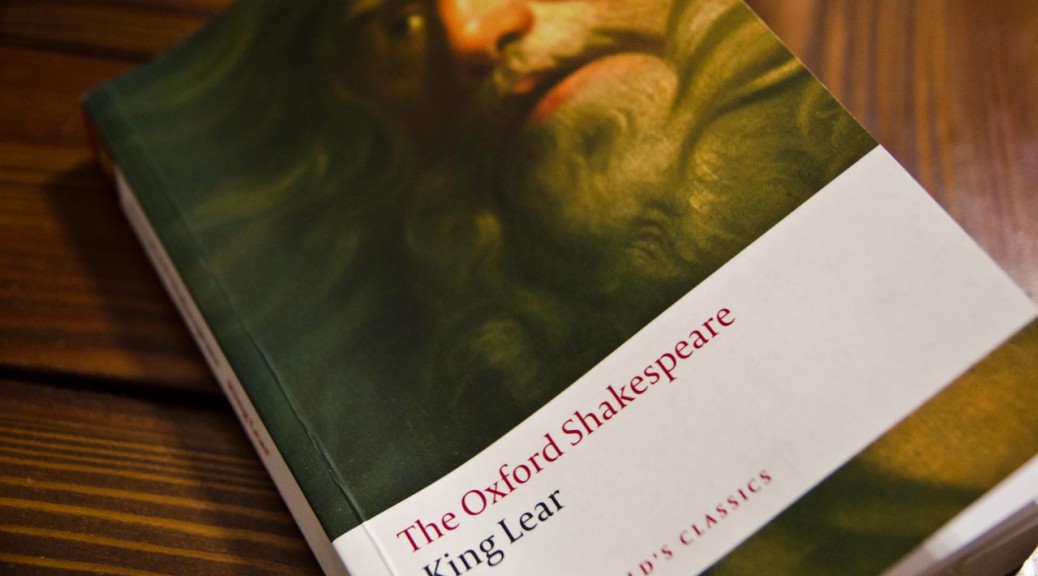
King Lear (II)
Shakespeare, William, and Stanley Wells. The History of King Lear. Oxford: Oxford UP, 2008. Print.
Sc. 1
CORDELIA (aside) Then poor Cordelia-
And yet not so, since I am sure my love’s
More richer than my tongue.
line 70
—–
KENT
Let it fall rather, though the fork invade
The region of my heart. Be Kent unmannerly
When Lear is mad. What wilt thou do, old man?
Think’st thou that duty shall have dread to speak
When power to flattery bows? To plainness honour’s
bound
When majesty stoops to folly. Reverse thy doom,
And in thy best consideration check
This hideous rashness. Answer my life my judgement,
Thy youngest daughter does not love thee least,
Nor are those empty-hearted whose low sound
Reverbs no hollowness
line 135-line 144
See Dent V36
Henry the VIII “I did never know so full a voice issue from so empty a heart.” p. 107
“The empty vessel makes the greatest sound.” p. 108
——
Sc. 2
——-
GLOUCESTER These late exlipses in the sun and moon portend no good to us. Though the wisdom of nature can reason thus and thus, yet nature finds itself scourged by the sequent effects. Love cools, frienship falls off, brothers divide; in cities mutinies, in countries discords, palaces treason, the bond cracked between son and father. Find out this villain, Edmund; it shall lose thee nothing. Do it carefully. And the noble and true-hearted Kent banished, his offence honesty! Strange, strange!
Exit
EDMUND this is excellent foppery of the world: that when we are sick in fortune-often the surfeit of our own behaviour-we make guilty of our disasters the sun, the moon, and the stars, as if we were villains by necessity, fools by heavenly compulsion, knaves, thievesm abd treacherers by spherical predominance, drunkards, liars, and adulterers by an enforced obedience of planetary influence, and all that we are evil in by a divine thrusting on. An admirable evasion of whoremaster man, to lay his goatish disposition to the charge of stars!
My father compounded with my mother under the Dragon’s tail and my nativity was under Ursa Major, so that it follows I am rough and lecherous. Fut! I should have been that I am had the maidenliest star of the firmament twinkled on my bastardy. Edgar…
Line 100-124
—–
EDMUND I do serve you in this business. Exit Edgar
A credulous father, and a brother noble,
Whose nature is so far from doing harms
That he suspects none; o whose follish honesty
My practice ride easy. I see the business.
Let me, if not by birth, have lands by wit.
All with me’s meet that I can fashion fit. Exit
Lines 160-166
—-
Sc. 4
—-
LEAR A pestilent gall to me!
FOOL [to Kent] Sirrah, I’ll teach thee a speech.
LEAR Do.
FOOL Mark it, uncle
Have more than thou showest
Speak less than thou knowest,
Lend less than thou owest,
Ride more than thou goest,
Learn more than thou trowest,
Set less than thou throwest,
Leave thy drink and thy whore,
And keep in-a-door,
And thou shalt have more
Than two tens to a score.
lines 109-121
—
FOOL Dost know the differnce, my boy, between a bitter fool and a sweet fool?
LEAR No, lad. Teach me.
FOOL [sings] That lord that counselled thee
To give away thy land,
Come, place him here by me;
Do thou for him stand.
The sweet and bitter fool
Will presently appear,
The one in motley here,
The other found out there.
LEAR Dost thou call me fool, boy?
Lines 130-141
—
Fool (to Lear) For, you trow, nuncle,
[sings]
The hedge-sparrow fed the cuckoo so long
That it had it head bit off by it young;
so out went the candle, and we were left darkling.
Lines 205-209
—
Sc. 7
—-
LEAR
Now I prithee, daughter, do not make me mad.
I will not trouble thee, my child. Farewell.
We’ll no more meet, no more see one another.
But yet thou art my flesh, my blood, my daughter-
Or rather a disease that lies within my flesh,
Which I must needs call mine. Thou art a boil,
A plague-sore, and embossed carbuncle
In my corrupted blood. But I’ll not chide thee.
Let shame come when it will, I don not call it.
I do not bid the thunder-bearer shoot,
Nor tell tales of thee to high-judging Jove.
Mend when thou canst; be better at thy leisure.
I can be patient, I can stay with Regan,
I and my hundred knights.
lines 375-387
—-
Sc. 14
—-
CORNWALL
See’t shalt thou never.-Fellows, hold the chair.-
Upon those eyes of thine I’ll set my foot.
GLOUCESTER
He that will think to live till he be old
Give me some help!-O cruel! O ye gods!
[Cornwall puts out one of Gloucester’s eyes and stampt on it]
lines 64-67
—
SERVANT (to Gloucester)
O, I am slain, my lord! Yet have you one eye left
To see more mischief on him.
[Regan stabs him again]
O! He dies
CORNWALL
Lest it see more, prevent it. Out, vile jelly!
He [puts out] Gloucester’s other eye
Where is thy lustre now?
GLOUCESTER
All dark and comfortless. Where’s my son Edmund?
Edmund, enkindle all the sparks of nature
To quite this horrid act.
lines 78-84
—
THIRD SERVANT
Go thou. I’ll fetch some flax and whites of eggs
To apply to his bleeding face. Now heaven help him!
Exeunt severally
lines 104-105
—-
Sc. 15
—-
GLOUCESTER
‘Tis the time’s plague when madmen lead the blind.
DO as I bid thee; or rather do thy pleasure.
Above the rest, be gone.
lines 46-46
—
Sc. 20
Enter King Lear mad, [crowned with weeds and flowers]
before line 80
—-
LEAR Ha, Gonoril! Ha, Regan! They flattered me like a dog,
and told me I had white hairs in my beard ere the black
ones were there. To say ‘ay’ and ‘no’ to everything I said
‘ay’ and ‘no’ to was no good divinity. When the rain
came to wet me once, and the wind to make me chatter,
when the thunder would not peace at my bidding, there I
found them, there I smelt them out. Go to, they are not
men of their words. They told me I was everything; ’tis a
lie, I am not ague-proof.
GLOUCESTER
The trick of that voice I do well remember.
Is’t not the King?
LEAR Ay, every inch a king.
Lines 95-105
—
LEAR…
With a more riotus appetite. Down from the waist
They’re centaurs, though women all above.
But to the girdle do the gods inherit;
Beneath is all the fiend’s. There’s hell, there’s
darkness,
There’s the sulphury put, burning, scalding,
Stench, consummation. Fie, fie, fie; pah, pah!
lines 119-124
—
LEAR I remember thy eyes well enough. Dost thou squiny
on me?
No, do thy worst, blind Cupid, I’ll not love.
Read thou that challenge. Mark the penning of ‘t.
GLOUCESTER
Were all the letters suns, I could not see one.
lines 129-135
—-
LEAR [removing his crown of weeds]
When we are born, we cry that we are come
To this great stage of fools. This’ a good block.
Lines 171-172
—
Note on page 243:
“Edgar with his staff, Oswald with his sword or rapier and dagger… ‘the staff-man never striketh but at the head, and thrusteth presently under at the body; and if a blow be first made, a thrust followeth’; the aim that is, is to cause the opponent to protect his head and then swiftly to attack his body before he can bring his arms down.”
—-
Sc. 21
—
****
LEAR You do me wrong to take me out o’th’ grave.
Thou art a soul in bliss, but I am bound
Upon a wheel of fire, that mine own tears
Do scald like molten lead.
CORDELIA Sir, know me.
lines 43-47
—-
Sc. 22
—
LEAR
Be your tears wet? Yes, faith. I pray, weep not.
If you have poison for me, I will drink it.
I know you do not love; for your sisters
Have, as I do remember, done me wrong.
You have a cause; they have not.
CORDELIA No cause, no cause.
lines 68-74
—–
Sc. 24
—
REGAN
Jesters do oft prove prophets.
—-
LEAR
Howl, howl, howl, howl! O, you are men of stones.
Had I your tongues and eyes, I would use them so
That heaven’s vault should crack. She’s gone for ever.
I know when one is dead and when one lives.
She’s dead as earth.
lines 253-357
—-
falchion
—
Sc. 24
—
LEAR
And my poor fool is hanged. No, no life.
Why should a dog, a horse, a rat have life,
And thou no breath at all? O, thou wilt come no more.
Never, never, never.-Pray you, undo
This button. Thank you, sir. O, O, O, O!
EDGAR He faints. (To Lear) My lord, my lord!
LEAR Break, heart, I prithee break.
EDGAR Look up, my lord.
KENT
Vex not his ghost. O, let him pass. He hates him
That would upon the rack of this tough world
Stretch him out longer.
[Lear dies]
EDGAR O, he is gone indeed.
lines 300-310
—
To read: Kermode, Frank, ed., Shakespeare: ‘King Lear’, A Casebook (1969) includes essay by George Orwell
See Grande Ouverture du Roi Léar, Opus 4, by Hector Berlioz
—
Oxford World’s Classics
John Milton’s Selected Poetry
Sir Philip Sidney‘s The Old Arcadia
Henry of Huntingdon’s The History of the English People 1000-1154
—
The Ballad of King Lear
Perrett “And to thousands of children it tells Cordelia’s pathetic story when Shakespeare is a mere name, and conveys some inkling of a different morality from that which is inculcated by the customary materialism of a golden crown to reward the Beautiful.” p. 279
A lamentable Song of the Death of King Leir and his Three Daughters
King Lear once rulèd in this land
With princely power and peace;
And had all things with hearts content,
That might his joys increase.
Amongst those things that nature gave,
Three daughters fair had he,
So princely seeming beautiful,
As fairer could not be.
So on a time it pleas’d the king
A question thus to move,
Which of his daughters to his grace
Could shew the dearest love:
“For to my age you bring content,”
Quoth he, “then let me hear,
Which of you three in plighted troth
The kindest will appear.”
To whom the eldest thus began;
“Dear father, mind,” quoth she,
“Before your face, to do you good,
My blood shall render’d be
And for your sake my bleeding heart
Shall here be cut in twain,
Ere that I see your reverend age
The smallest grief sustain.”
“And so will I,” the second said;
“Dear father, for your sake,
The worst of all extremities
I’ll gently undertake:
And serve your highness night and day
With diligence and love;
That sweet content and quietness
Discomforts may remove.”
“In doing so, you glad my soul,”
The aged king reply’d;
“But what sayst thou, my youngest girl,
How is thy love ally’d?”
“My love” (quoth young Cordelia then)
“Which to your grace I owe,
Shall be the duty of a child,
And that is all I’ll show.”
“And wilt thou shew no more,” quoth he,
“Than doth thy duty bind?
I well perceive thy love is small,
When as no more I find.
Henceforth I banish thee my court,
Thou art no child of mine;
Nor any part of this my realm
By favour shall be thine.
“Thy elder sisters loves are more
Then well I can demand;
To whom I equally bestow
My kingdome and my land,
My pompal state and all my goods,
That lovingly I may
With those thy sisters be maintain’d
Until my dying day.”
Thus flattering speeches won renown,
By these two sisters here;
The third had causeless banishment,
Yet was her love more dear:
For poor Cordelia patiently
Went wandring up and down,
Unhelp’d, unpity’d, gentle maid,
Through many an English town:
Untill at last in famous France
She gentler fortunes found;
Though poor and bare, yet she was deem’d
The fairest on the ground:
Where when the king her virtues heard,
And this fair lady seen,
With full consent of all his court
He made his wife and queen.
Her father king Leir this while
With his two daughters staid:
Forgetful of their promis’d loves,
Full soon the same decay’d;
And living in queen Ragan’s court,
The eldest of the twain,
She took from him his chiefest means,
And most of all his train.
For whereas twenty men were wont
To wait with bended knee:
She gave allowance but to ten,
And after scarce to three;
Nay, one she thought too much for him;
So took she all away,
In hope that in her court, good king,
He would no longer stay.
“Am I rewarded thus,” quoth he,
“In giving all I have
Unto my children, and to beg
For what I lately gave?
I’ll go unto my Gonorell:
My second child, I know,
Will be more kind and pitiful,
And will relieve my woe.”
Full fast he hies then to her court;
Where when she heard his moan
Return’d him answer, that she griev’d
That all his means were gone:
But no way could relieve his wants;
Yet if that he would stay
Within her kitchen, he should have
What scullions gave away.
When he had heard, with bitter tears,
He made his answer then;
“In what I did let me be made
Example to all men.
I will return again,” quoth he,
“Unto my Ragan’s court;
She will not use me thus, I hope,
But in a kinder sort.”
Where when he came, she gave command
To drive him thence away:
When he was well within her court
(She said) he would not stay.
Then back again to Gonorell
The woeful king did hie,
That in her kitchen he might have
What scullion boys set by.
But there of that he was deny’d,
Which she had promis’d late:
For once refusing, he should not
Come after to her gate.
Thus twixt his daughters, for relief
He wandred up and down;
Being glad to feed on beggars food,
That lately wore a crown.
And calling to remembrance then
His youngest daughters words,
That said the duty of a child
Was all that love affords:
But doubting to repair to her,
Whom he had banish’d so,
Grew frantick mad; for in his mind
He bore the wounds of woe:
Which made him rend his milk-white locks,
And tresses from his head,
And all with blood bestain his cheeks,
With age and honour spread.
To hills and woods and watry founts
He made his hourly moan,
Till hills and woods and sensless things,
Did seem to sigh and groan.
Even thus possest with discontents,
He passed o’re to France,
In hopes from fair Cordelia there,
To find some gentler chance;
Most virtuous dame! which when she heard,
Of this her father’s grief,
As duty bound, she quickly sent
Him comfort and relief:
And by a train of noble peers,
In brave and gallant sort,
She gave in charge he should be brought
To Aganippus’ court;
Whose royal king, with noble mind
So freely gave consent,
To muster up his knights at arms,
To fame and courage bent.
And so to England came with speed,
To repossesse king Leir
And drive his daughters from their thrones
By his Cordelia dear.
Where she, true-hearted noble queen,
Was in the battel slain;
Yet he, good king, in his old days,
Possest his crown again.
But when he heard Cordelia’s death,
Who died indeed for love
Of her dear father, in whose cause
She did this battle move;
He swooning fell upon her breast,
From whence he never parted:
But on her bosom left his life,
That was so truly hearted.
The lords and nobles when they saw
The end of these events,
The other sisters unto death
They doomed by consents;
And being dead, their crowns they left
Unto the next of kin:
Thus have you seen the fall of pride,
And disobedient sin.


